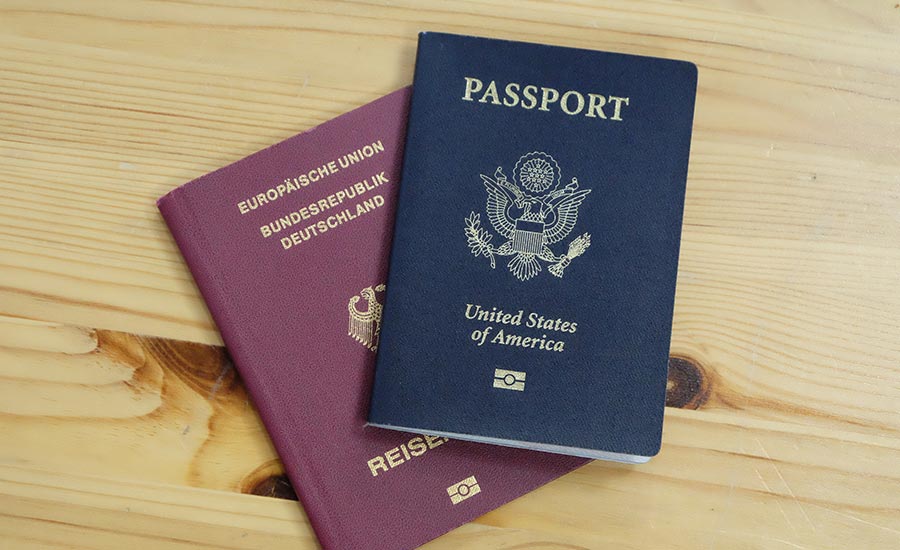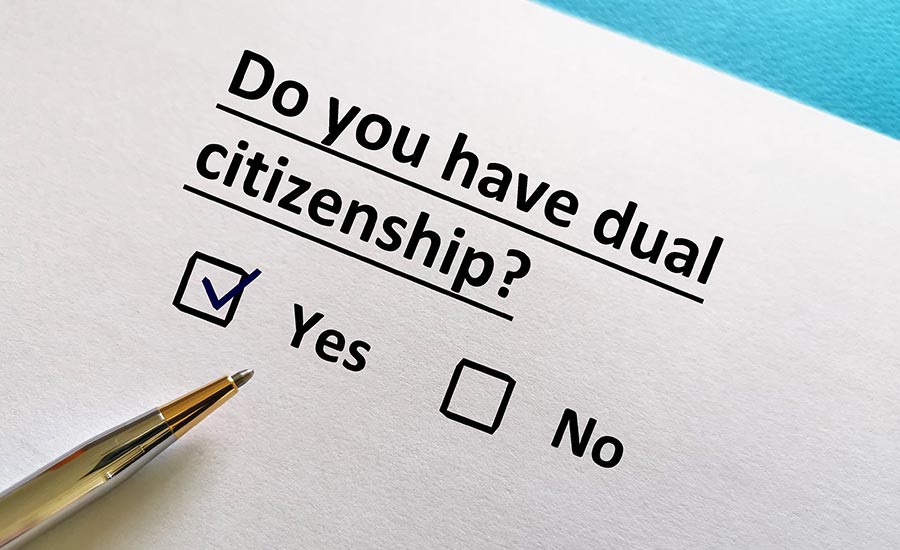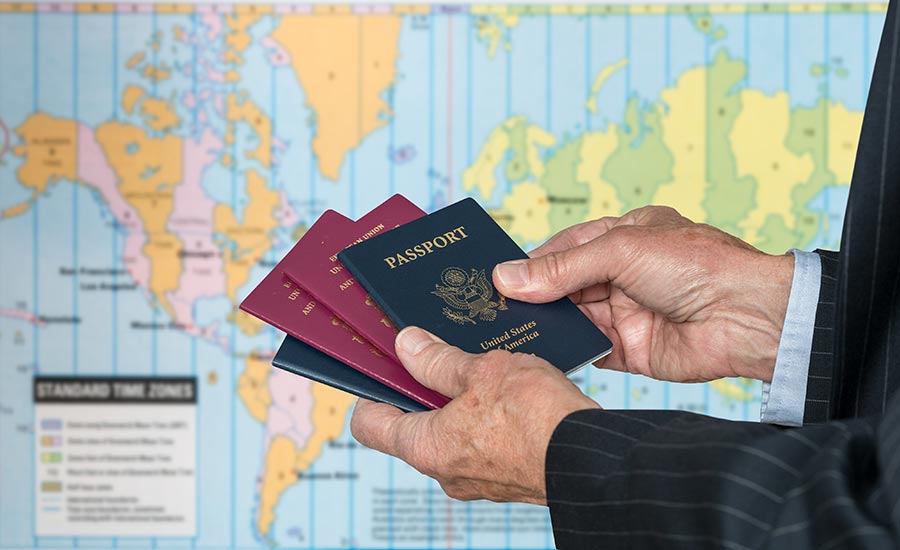

Taking the concept of citizenship beyond borders, globalization or dual citizenship allows you to hold allegiance to more than one nation.
We’ll share the advantages and disadvantages of dual citizenship, explain how to get dual citizenship in the United States and answer some frequently asked questions on the topic.
Plus, we’ll introduce you to our experienced immigration firm, Spar & Bernstein, as your trusted partner on your journey towards dual citizenship.
What Is Dual Citizenship?
Dual citizenship, or dual nationality, is a legal status that allows you to be a citizen of two countries simultaneously.
Having dual citizenship means you have the rights and obligations of citizenship in both countries.
Viewed with skepticism by the U.S. government in the past due to concerns about divided loyalties, dual citizenship is accepted today as a natural result of global connections and diverse backgrounds.
How Does Dual Citizenship Work In The US?
If you want to become a U.S citizen, you do not have to renounce your existing citizenship from another country.
Having dual citizenship in the U.S. allows you to:
- Live, work and travel to both U.S. and your country of origin without the need for a visa or residence permit
- Access various educational and employment opportunities in both countries
- Access healthcare, social services and retirement benefits in both countries
- Invest in real estates in both countries
- Vote and participate in political initiatives
- Seek consular assistance from the embassies of both countries
- Obtain Green Cards for your family, including parents and children
Apart from the advantages above, dual citizenship comes with certain obligations and challenges. If you have dual citizenship, you typically will have to:
- Report foreign financial accounts
- Pay income tax in both countries
- Face travel restrictions in countries that do not accept dual citizenship holders — especially if there are diplomatic tensions between the country you are traveling to and the countries in which you are a citizen
- Enroll for military service in the country of origin
- Serve on a jury when summoned
- Face restrictions when applying for roles in the U.S. that are related to government or classified information
To be able to hold two citizenships at the same time, your country of origin must allow dual citizenship as well.
More than 75% of countries worldwide allow dual citizenship. Most countries that allow dual citizenship, one of which is U.S. citizenship, are in Latin America and Europe.
If you are considering dual citizenship in the U.S. and are not sure about your country of origin’s law and the legal implications entailed in the process, schedule a consultation with our experienced and compassionate immigration attorneys at Spar & Bernstein.
We will research your options and give you professional advice on the best route to obtaining dual citizenship.

How To Get Dual Citizenship In The US
To get dual citizenship in the U.S., you need to apply for U.S. citizenship.
Before starting the process, make sure to check with the Embassy or Consulate in your country of origin to determine whether you are allowed to hold dual citizenship.
Note that if your country of origin does not allow dual citizenship, applying for U.S. citizenship may cause you to lose citizenship from your country of origin.
Once you establish that dual citizenship is permitted by your home country, you will typically need to go through the process of naturalization.
Whether you need to go through naturalization to become a U.S. citizen and what the steps leading to naturalization are, can vary depending on your specific situation, which may include but are not limited to, whether you were born in the U.S., married to a U.S. citizen or acting as an investor.
1. Obtaining U.S. Citizenship By Naturalization
If you are a lawful permanent resident and want to apply for citizenship, you must pass through the process of naturalization.
The naturalization eligibility requirements include:
- Being at least 18 years old
- Holding a Green Card for five years — or for three years, if you are married to a U.S. citizen
- Meeting residency requirements
- Meeting physical presence criteria
- Demonstrating good moral character
- Passing a background check
- Having basic English language skills
- Having knowledge of U.S. government and history
To apply for citizenship through naturalization:
- File Form N-400, Application for Naturalization, together with supporting documentation and required application and biometrics fee
- Attend a biometrics appointment for fingerprinting which will be used for background checks
- Go for an interview with an officer of the U.S. Citizenship and Immigration Services (USCIS) — the interview includes an English and a civics test
- Take the Oath of Allegiance
2. Obtaining U.S. Citizenship By Marriage
Another way to obtain citizenship is by marrying a U.S. citizen. In this case, you must:
- Obtain a marriage-based Green Card
- Apply for U.S. citizenship through naturalization after three years of marriage to your U.S. citizen spouse and after obtaining lawful permanent residence
3. Obtaining U.S. Citizenship By investment
If you are an investor, you can apply for U.S. citizenship based on your financial contributions to the country’s economy.
Here is the process to follow:
- Apply for an investment-based Green Card following the requirements for investment amount, job creation and active engagement in the enterprise management
- Remove conditions from your Green Card after two years, if your hold a conditional Green Card
- Follow the naturalization process steps
4. Obtaining U.S. Citizenship By Birth
If you are born in the U.S., you acquire citizenship automatically regardless of the citizenship held by your parents.
After birth, you get a birth certificate verifying your U.S. citizenship.
5. Obtaining U.S. Citizenship By Descent
You can obtain U.S. citizenship through descent, also known as “acquisition” or “derivation” of citizenship.
This path can be valid if you were born outside the U.S. and at least one of your parents is a U.S. citizen. The process varies based on when you were born, your parents’ citizenship status and the relevant laws at the time.
As per the applicable laws:
- If you are under the age of 18 and a lawful permanent resident living in the U.S. with at least one parent who is a U.S. citizen, you can acquire U.S. citizenship automatically provided you meet the citizenship requirements.
- If you were born before November 14, 1986, and at least one of your parents is a U.S. citizen, you can acquire U.S. citizenship if:
– Your U.S. citizen parent lived in the U.S. for a specified time before your birth
– Your U.S. citizen parent met physical presence and residency requirements
- If you were born after November 14, 1986, you may acquire U.S. citizenship if:
– One of your parents is a U.S. citizen by birth or naturalization
– Your U.S. citizen parent lived in the U.S. for a certain period before your birth
– Your U.S. citizen parent met specific requirements related to physical presence and residency in the U.S.
To apply for U.S. citizenship by descent:
- Collect documents to establish your lineage to a U.S. citizen parent – these may include birth certificates and marriage certificates
- Verify your eligibility for citizenship
- Complete and file Form DS-2029, Application for Consular Report of Birth Abroad of a Citizen of the U.S. along with required supporting documents
- Attend an interview at the Embassy or Consulate in your country
- Apply for a U.S. passport once your application is approved

Need Help With Dual Citizenship? Contact Spar & Bernstein
If you are considering dual citizenship in the U.S., our attorneys at The Law Offices of Spar & Bernstein can help you along your journey.
With 50+ years of experience in family and employment immigration, marriage-based visas and investor visas, our knowledgeable attorneys will:
- Research your eligibility for dual citizenship
- Prepare and file needed documentation
- Communicate with authorities, including USCIS, Embassies and Consulates, on your behalf
- Prepare you for your naturalization interview
- Track the progress of your citizenship application and keep you updated throughout the process
Handling each case with compassion and care, our experienced team will help you navigate the complex landscape of dual citizenship.
FAQs on Getting Dual Citizenship
Dual citizenship is an extensive topic that may pose dozens of questions. If you did not find the answer to your questions above, check out some of the frequently asked questions our clients have asked us over the years.
1. Who is eligible for dual citizenship in the U.S.?
Anyone who meets the requirements for naturalization in the U.S. may apply to become a citizen. However, you should check with the Embassy or Consulate in your country of origin to determine whether you are allowed to have dual citizenship.
2. When can I apply for dual citizenship in the U.S.?
You can apply for U.S. citizenship at any time, provided you meet the naturalization eligibility requirements. Typically, this happens after you have had your Green Card for three years (after marriage to a U.S. citizen) or for five years in any other case.
3. Which passport should I use when traveling if I have dual citizenship?
If you have dual citizenship and several passports, you must use your U.S. passport when entering and leaving the U.S.
If you are traveling to a country different from the U.S., you can use either passport.
4. Can I apply for U.S. citizenship if I served in the U.S. military?
Yes, serving in the U.S. military gives you the right to apply for expedited naturalization. If you want to obtain dual citizenship, make sure your country of origin allows it.
5. How can I check if my country of origin allows dual citizenship?
To check if your country of origin allows dual citizenship:
- Research your country’s citizenship laws
- Consult with the embassy or consulate to determine whether they permit dual citizenship
- Call our experienced immigration lawyers at Spar & Bernstein — we’ll provide the most updated information and will help you with your next steps
6. How long is the naturalization process?
Depending on the USCIS field office where you filed your application, the process may take anywhere from one year and six months to several years.
7. What countries do not allow to have dual citizenship with the U.S.?
Some of the countries that do not allow dual citizenship with the U.S. include India, Japan, China, and United Arab Emirates.
If you are coming from one of these countries and applying for U.S. citizenship you may automatically lose your current citizenship.
Make sure to check your options with a knowledgeable immigration attorney.
8. Is triple citizenship allowed in the U.S.?
Yes, triple citizenship is allowed in the U.S.


